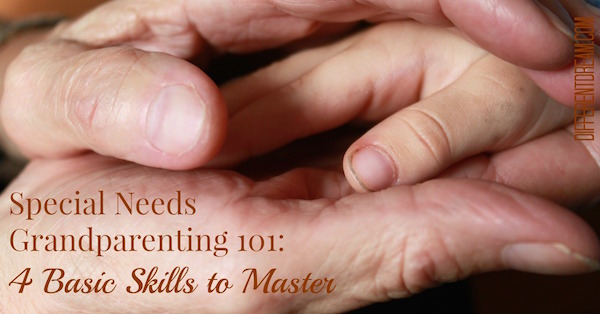Special Needs Grandparenting 101

Today Different Dream welcomes guest blogger Kathy Guzzo. She’s back today with advice for grandparents of kids with special needs. She recommends these 4 basic skills for grandparents who want to support their adult children and be involved in the lives of their grandchildren with special needs.
Special Needs Grandparenting 101
Many times I’ve wished for a manual or a how to class available at specific times in my life. It would’ve been amazing to be handed a “how to be married” manual after we said our ‘I dos.’ Or if we’d been given a manual for each child as we left the hospital covering every aspect of parenthood. I can only assume that those manuals could prevent many foreseeable problems. Unfortunately, manuals like that don’t exist so we all attend the school of hard knocks, better known as experience. Not always the easiest way to learn, but usually the most effective.
Like everything else, special needs grandparenting doesn’t come with a manual. It too is learned through experience. However, being a positive role model as a grandparent to special needs children requires more than experience. It requires knowledge, understanding, involvement, and love.
Basic Skill #1: Knowledge
Because they’ve lived for decades, grandparents have plenty of knowledge, yet most are unfamiliar with special needs diagnoses. Terms such as autism, ADHD, PTSD, IEP, PT, behavior specialist, speech therapy, and chronic illness are like a foreign language to us. Taking the initiative to learn about a grandchild’s uniqueness is a huge step in playing a role in that child’s life. However, a know-it-all attitude isn’t the answer either. We should seek the knowledge for ourselves, not to push it on others.
Basic Skill #2: Understanding
With knowledge comes a better ability to understand the physical and emotional needs of the family. The ability to recognize the stressors a child with special needs brings to the family, to realize the severity of the diagnosis, to appreciate the long term prognosis, and to begin to grasp the numerous ways available to help makes the situation better for everyone.
Basic Skill #3: Involvement
The ability to understand not only results in a desire to be involved, but also willingness to do whatever it takes to contribute positively to the family. This could be anything from participating in therapy sessions, attending doctor’s appointments, cooking meals, giving the parents a much needed break, or being a listening ear. Involvement doesn’t mean creating our own agenda for what we think is best for the family. Involvement requires respect with a servant’s heart.
Basic Skill #4: Love
The more grandparents are involved with our grandchildren with special needs, the more their love for us will be apparent. Love without expectation, but filled with acceptance; love that builds up and doesn’t tear down; love without the need for acknowledgment, but a desire to quietly give; love that’s willing to dream appropriate dreams for our grandchildren.
The role of grandparent isn’t always easy to define, but if the mind and heart are open to knowledge, understanding, involvement, and love, the impact we can have on the lives of our special needs grandchildren is immeasurable. And the love and appreciation we receive in return will truly be priceless.
What Special Needs Grandparenting Basic Skills Would You Add to the Syllabus?
Are there some other basic skills you recommend grandparents master to become involved in their grandchildren’s lives? Share them in the comment box!
Part 1: Different Dream’s Special Needs Grandparenting Series Begins
Part 2: Special Needs Grandparenting 101
Part 3: Special Needs Grandparenting–The First Word Is Never the Last Word
Part 4: The Special Needs Grandparenting Tug of War
Part 5: Special Needs Grandparents Are Part of the Village
Part 6: What’s It Like to Be a Special Needs Grandparent?
Part 7: From a Special Needs Grandpa
Do you like what you see at DifferentDream.com? You can receive more great content by subscribing to the quarterly Different Dream newsletter and signing up for the daily RSS feed delivered to your email inbox. You can sign up for the first in the pop up box and the second at the bottom of this page.

By Kathy Guzzo
Kathy Guzzo and her husband live in Northern Illinois and have 4 adult children. One of her daughters was diagnosed with lupus and Epstein Barr Replication as a young adult. Another began struggling with depression and OCD in her mid-twenties. She understands the need for her daughters to be able to make their own decisions regarding their health, but the nurturer in her sometimes has a hard time letting go. She desires to direct others to the peace and hope that God has abundantly available for them.
Subscribe for Updates from Jolene
Related Posts
The Lessons I Learned while Raising a Child with EA/TEF
Jolene Philo reflects on a lifetime of lessons learned while raising a child with EA/TEF and shares the insights she’s won.
Looking Back at Your Child’s EA/TEF Journey
Looking back at your child’s EA/TEF journey can give parents a new perspective about past events. Guest blogger Maggi Gale shares how her look back clearly showed her how God was with their family during their daughter’s very unusual first weeks of life in 2002. Three...
How Do I Let Go of My Adult EA/TEF Child?
Valeria Conshafter explores the question “How do I let go of my adult EA/TEF child?” for EA/TEF Awareness Month.






0 Comments